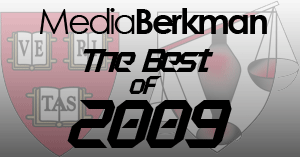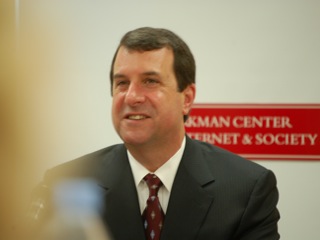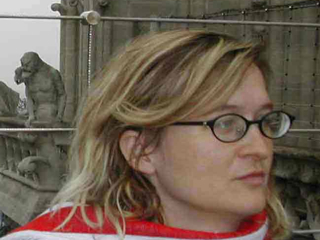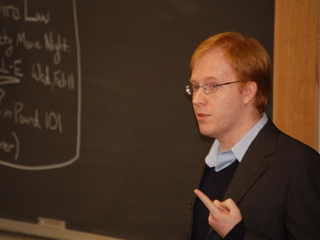MediaBerkman’s Top 11 Topics of 2009
December 18th, 2009
 The Berkman Center for Internet & Society hosted, partnered on, and generated a heaping helping of fascinating talks and pieces of media in 2009 – and tens of thousands of YOU watched, listened, discussed, and linked to our media – which just goes to show how big of year its been for internet, society, and technology! In honor of the Berkman Center’s 11th year, we take a look back at 2009 and see what you thought were 11 of the most interesting topics.
The Berkman Center for Internet & Society hosted, partnered on, and generated a heaping helping of fascinating talks and pieces of media in 2009 – and tens of thousands of YOU watched, listened, discussed, and linked to our media – which just goes to show how big of year its been for internet, society, and technology! In honor of the Berkman Center’s 11th year, we take a look back at 2009 and see what you thought were 11 of the most interesting topics.
1. Mobile Privacy
Privacy and the web was a hot button issue as always, and more of a mobile concern this year than ever as cell phones become increasingly ubiquitous and powerful. Al Gidari, Jr. of Perkins Coie raised some of these concerns in his March 10th talk “They Know Where You Are: Location Privacy in a Mobile World.” Mobile carriers get 100 requests a week for users’ location data from government officials, according to Al. But civil litigants and private application providers are not far behind. Should we be worried?
They Know Where You Are: Location Privacy in a Mobile World
Click Above for Video
…or download the OGG video format!
2. Activism in the Middle East
The disputed Iranian election this summer resulted in the country’s largest uprising in decades. Activists in the Middle East are increasingly relying on the power of the web and ubiquitous mobile computing to communicate with one another and get news, photos, and video to friends in the international community. Pioneering cyber activist Esra’a Al Shafei, founder and Executive Director of MideastYouth.com, has been quietly assisting activists all over the Middle East by providing a forum for dialogue, collaboration, and expression. Months before the Iranian election, in February, Esra’a paid a visit to the Berkman Center to talk about how cyber-activists are tackling the region’s widespread human rights issues using Internet and social media tools.
Challenges of Activism in the Middle East
![]() Download the MP3
Download the MP3
Cameran Ashraf on #iranelection: The digital media response to the 2009 Iranian election
Only months after the Iranian election, in November, we were joined by Cameran Ashraf & Brett Solomon who explored the role new communication technologies are playing in the post-election unrest, how people outside of Iran are helping through digital media, and the Iranian government’s efforts at maintaining its information border.
Click Above for Video
…or download the OGG video format!
3. Filtering
This year Berkman helped launch a big new experiment in crowdsourcing and filtering – Herdict.org. The brainchild of Berkman Center co-founder Jonathan Zittrain, Herdict’s goal is to empower web users around the world to find out what sites are being blocked, and where and why they are being blocked. In this video Herdict’s mascot Shep the Sheep shows just how Herdict works:
[kml_flashembed movie="http://www.youtube.com/v/NggzBHSXdCo" width="425" height="350" wmode="transparent" /]
We also had Jonathan Zittrain to explain Herdict in more detail on Radio Berkman and at our luncheon series in February.
4. Social Media, Obama, and the Gov’t
With the arrival of a new White House resident in January came a fresh attitude towards transparency and the use of the web and social media to involve citizens more in the work of government. In May, Elizabeth Losh spoke at the Berkman Center about e-government and some of the issues raised by the Obama administration’s use of proprietary, third-party, commercial software in this effort.
From the Crowd to the Cloud: Social Media in the Obama Administration
Click Above for Video
…or download the OGG video format!
Radio Berkman: What do you call a web-enabled political system?
When President Obama himself led one of the first online townhalls earlier this year Americans submitted and voted on over 100,000 questions, with mixed results. On Radio Berkman, Berkman fellow Gene Koo shared some of his own thoughts on how federal agencies can improve this process in the future.
![]() Download the MP3
Download the MP3
…or download the OGG audio format!
Radio Berkman: This Wiki Post Will Self-Destruct in 5…4…3…
The White House isn’t the only one getting into the act. Several years in the making, the CIA’s Intellipedia project has brought the Wikipedia concept into the highly secretive intelligence sector. Two of the principals behind the project discuss its progress.
![]() Download the MP3
Download the MP3
…or download the OGG audio format!
5. The GoogleBooks Settlement
The proposed Google Book Search settlement was a big debate this year – on the one hand, the possibility of unprecedented access to a huge body of knowledge for scholars, libraries, and the public – on the other hand, legal, business, and privacy concerns that come with the idea of one company having exclusive rights to content and distribution.
Legal Scholar Lawrence Lessig asks: “What should we fear?”
Lawrence Lessig on the Google Book Search Settlement – “Static goods, dynamic bads”
[kml_flashembed movie="http://www.youtube.com/v/Svytkew5qPI" width="425" height="350" wmode="transparent" /]
Google’s Alexander Macgillivray on the Google Book Search Settlement
Alexander Macgillivray, until recently Deputy General Counsel for Products and Intellectual Property at Google (now Twitter’s General Counsel), gives an insider’s look at the Google Book Search Settlement, its intricacies, pros, and cons, and responds to provocative questions and comments.
[kml_flashembed movie="http://www.youtube.com/v/I2o0lImxl14" width="425" height="350" wmode="transparent" /]
6. The Future of Search
Whether you are still amazed, or sick of the hype, “Computational Knowledge Engine” Wolfram|Alpha generated incredible buzz months before its actual release. Bloggers and commenters touted it as a “Google Killer” and denounced it as snake oil before screenshots were even leaked. Either way, Wolfram|Alpha raised some interesting questions about the future of search. David Weinberger spoke with the brains behind the engine, Stephen Wolfram, in May about how Wolfram|Alpha would work, and how information on the web is managed.
![]() Download the MP3
Download the MP3
…or download the OGG audio format!
7. The Future of Books and Ownership
In 2008, renowned sci-fi author and copyright provocateur Cory Doctorow proved freely shared works could still succeed financially when his CC-licensed novel “Little Brother” spent several weeks on the New York Times bestseller list. In 2009, he seemed to turn coat when he blogged in support of copyright for e-books – not for the benefit of publishers, but for the benefit of bibliophiles who are seeing their ability to excerpt from, share, and resell the books the buy increasingly constrained by technological means and restrictive End User License Agreements.
Radio Berkman 137: Cory Doctorow – In Defense of ©
![]() Download the MP3
Download the MP3
…or download the OGG audio format!
8. Net Neutrality
In 2008, FCC ordered the Comcast to quit their practice of blocking BitTorrent on their high speed internet service. In 2009, net neutrality remains a hot topic as the FCC considers a suite of new policy proposals for high speed internet. Chris Riley, Policy Counsel at Free Press, gave a brief history of the Comcast proceeding and the overall legal landscape for net neutrality in one of our more popular talks this year.
Comcast, BitTorrent, and Network Neutrality
Click Above for Video
…or download the OGG video format!
9. Safe Web
Early 2009 saw the release of an exhaustive report entitled “Enhancing Child Safety and Online Technologies.” This research effort was commissioned by a multi-state working group of Attorneys General and coordinated by the Berkman Center’s danah boyd, Laura DeBonis, John Palfrey, and Dena Sacco as part of the Internet Safety Technical Task Force. How can we use technology to help industry and families to protect minors on the internet? David Weinberger spoke with Palfrey and Sacco for more details.
![]() Download the MP3
Download the MP3
…or download the OGG audio format!
The team also spoke at a Berkman luncheon earlier this year.
10. Twitter
Twitter turned three years old this year. But it experienced some of the most rapid growth in popularity in its short history as the general public became “tweeters” in droves, while institutions from businesses to activist groups adopted Twitter as a central part of their communications strategy. With this swift growth came the inevitable media hype. Radio Berkman decided to see if there was possibly anything new left to say about the microblogging service.
Radio Berkman 128: Tweeting a Dead Horse
![]() Download the MP3
Download the MP3
…or download the OGG audio format!
11. The Ethics of Distributed Digital Labor
Watch out for this topic in the coming year. Amazon’s Mechanical Turk has generated heavy buzz as a revolutionary method of crowdsourcing and outsourcing work using the power of the web. Jonathan Zittrain takes a look at a few of the hundreds of other examples of digitally distributed labor, and wonders: what are the ethical and legal implications?
Jonathan Zittrain: “Minds for Sale”
[kml_flashembed movie="http://www.youtube.com/v/Dw3h-rae3uo" width="425" height="350" wmode="transparent" /]
=============
Want more? Here are 11 more of our favorite pieces of media from 2009 that didn’t make the list.
Ethan Zuckerman on Mapping Globalization
http://cyber.law.harvard.edu/interactive/events/luncheon/2009/01/zuckerman
Rebecca MacKinnon on China and the future of the Internet
http://cyber.law.harvard.edu/events/luncheon/2009/03/mackinnon
Peter Suber on the future of open access
http://cyber.law.harvard.edu/events/2009/02/suber
The Long Tail of Gadgets – How Open Source Hardware is Enabling Bottom Up Innovation in Electronics
http://cyber.law.harvard.edu/interactive/events/luncheon/2009/01/semmelhack
Adventures in Anonymity
http://cyber.law.harvard.edu/interactive/podcasts/radioberkman130
David Weinberger on What Information Was
http://cyber.law.harvard.edu/interactive/events/luncheons/2009/11/weinberger
Clay Shirky asks “How’s Your Web?”
http://cyber.law.harvard.edu/interactive/podcasts/radioberkman131
Communication and Human Development: The Freedom Connection?
http://cyber.law.harvard.edu/interactive/events/2009/09/idrc/idrcpanel
Richard Susskind on “The End of Lawyers?”
http://cyber.law.harvard.edu/interactive/events/2009/04/susskind
Secrecy: a Roundtable with Peter Galison, Robb Moss, Jack Goldsmith, Martha Minow, and Jonathan Zittrain
http://cyber.law.harvard.edu/interactive/events/2009/02/secrecy
Jesse Shapins, James Burns, and Kara Oehler on Mapping Main Street
http://cyber.law.harvard.edu/interactive/events/luncheons/2009/10/mapping
Entry Filed under: Berkman Center
1 Comment Add your own
Leave a Comment
Some HTML allowed:
<a href="" title=""> <abbr title=""> <acronym title=""> <b> <blockquote cite=""> <cite> <code> <del datetime=""> <em> <i> <q cite=""> <s> <strike> <strong>








1. barry tuch | January 16th, 2010 at 12:51 am
Was a busy year for all of us. Keeping up with the accelerating technological change gives pause to any of us